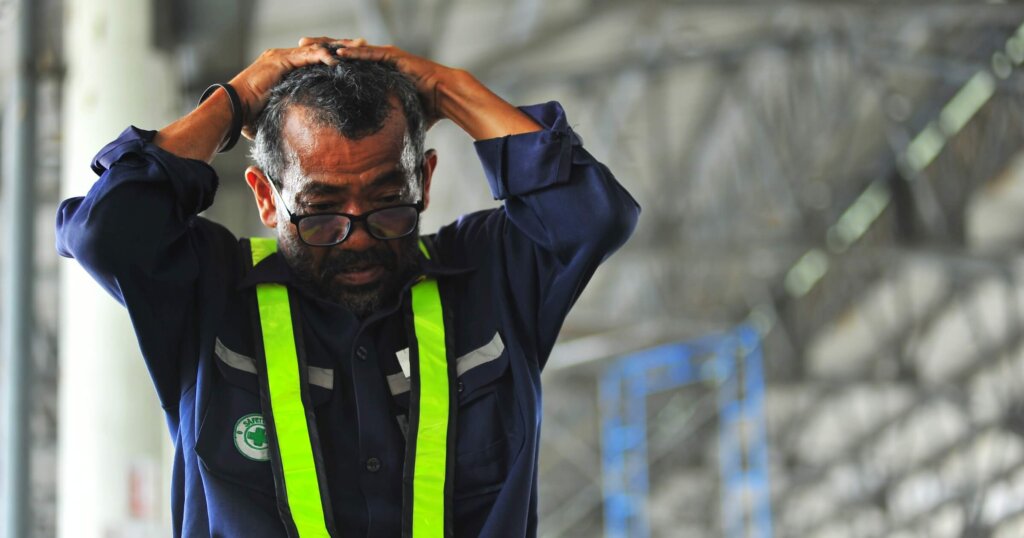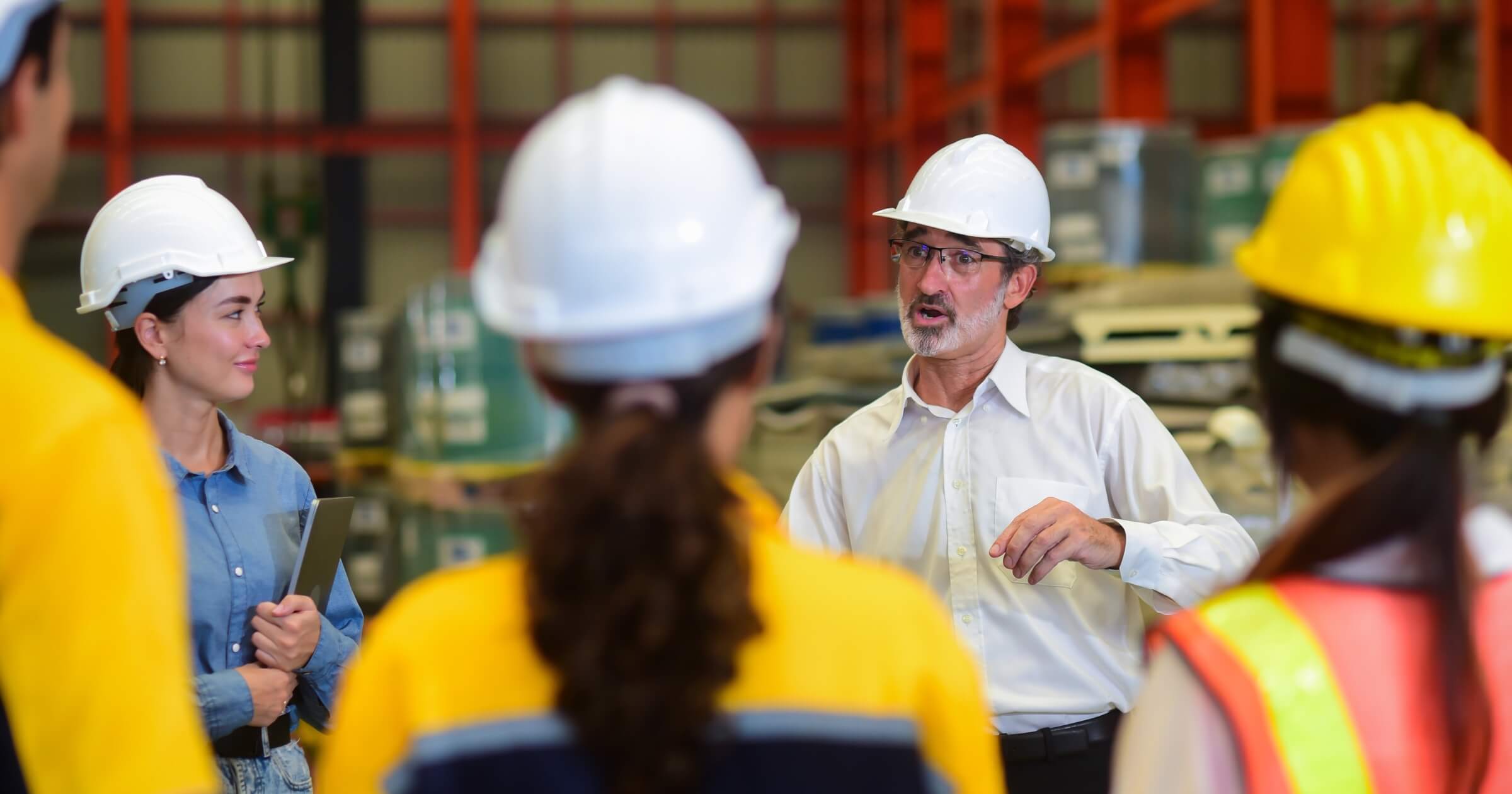Construction is one of the most demanding industries, where safety is a top priority—but the focus is usually on physical risks, not mental well-being. Long hours, high-pressure environments, and a culture that rewards toughness can make it difficult for workers to speak up about stress, safety concerns, or burnout. When people feel psychologically safe on the job, they’re more likely to report hazards, support one another, and stay engaged, leading to a safer workplace.
Quick look
- Workers who feel safe speaking up are likelier to report hazards, support one another, and contribute to a stronger, safer job site.
- A tough industry culture, high-risk environments, and mental health stigma make it difficult for workers to voice concerns.
- Psychological safety improves communication, reduces stress, strengthens teamwork, and prevents accidents.
- Encouraging open communication, offering anonymous reporting, and responding with empathy can create a culture of trust and safety.
What is psychological safety?

Psychological safety is the confidence that speaking up won’t lead to punishment, embarrassment, or backlash. In a construction setting, workers feel comfortable reporting safety concerns, asking questions, or admitting mistakes without fear of being ignored or reprimanded. When crews trust that their voices matter, teamwork improves, communication strengthens, and overall job safety increases. A psychologically safe workplace isn’t just more supportive—it’s more effective at preventing accidents and keeping projects running smoothly.
Why psychological safety is low in construction
The construction industry faces a serious mental health crisis, with suicide rates among workers among the highest of any profession. According to the CDC, construction workers are four times more likely to die by suicide than the general population.
When psychological safety is lacking, stress levels rise, job satisfaction declines, and turnover increases. Workers who feel unsupported or hesitant to speak up are more likely to experience burnout, disengagement, and absenteeism, negatively impacting productivity and site safety.
Factors contributing to the issue of psychological safety include:
- The industry’s tough culture: Construction often embodies a no-nonsense, “toughen up” mentality that discourages workers from expressing concerns or discussing personal challenges. This culture can make it difficult for individuals to admit mistakes or voice safety issues.
- High-risk work environment: Given the inherent physical dangers in construction, workers are always told to focus on physical safety, but rarely are mental health issues addressed.
- Mental health stigma: Many construction workers hesitate to discuss stress, anxiety, or burnout due to the fear of being perceived as weak. This stigma prevents open conversations about mental health, leading to unaddressed issues that can escalate over time.
Why psychological safety matters at work
When workers feel encouraged to speak up, it can rub off on other workers and encourage a constructive work environment. When done right, it can lead to several benefits on the site, including:
- Encourages workers to report safety concerns: When workers trust that they won’t be ignored or punished for raising issues, they’re more likely to report hazards before they become serious. This can prevent accidents and create a proactive approach to risk management.
- Reduces stress: Construction is already high-stress, and the pressure to stay silent about struggles only worsens things. When workers know they can speak up without fear of retaliation, stress levels decrease, burnout becomes less common, and job satisfaction improves.
- Strengthens teamwork and communication: Psychological safety creates an environment where workers can collaborate openly, ask questions, and support one another. When people feel heard and valued, morale increases, communication improves, and teams function more effectively.
Six strategies to increase psychological safety of workers
Building a culture of psychological safety in construction takes intentional effort, but small changes can make a significant impact. Here are key strategies to create a safer, more open work environment for employees.
1. Encourage workers to speak up
Many workers in construction hesitate to voice concerns, whether about safety risks, unrealistic deadlines, or mental well-being. Here are some tips on how to create a culture of speaking up:
- Reinforce that asking questions or reporting concerns is a strength, not a weakness.
- Train site managers and supervisors to actively listen, acknowledge worker concerns, and take meaningful action.
- Recognize and reward employees who speak up, showing that their input is valued and contributes to a safer workplace.
2. Create channels where workers can speak anonymously
Even in a supportive workplace, some employees may hesitate to report concerns, fearing retaliation or open judgment. Providing anonymous reporting channels allows workers to share safety issues, mental health struggles, or workplace concerns without fearing backlash. This can be done by implementing digital or paper-based anonymous reporting systems. The most important thing to ensure is that the system you use is 100% anonymous so workers feel confident about expressing their concerns.
3. Encourage reporting of unsafe working conditions
A safe job site depends on workers feeling empowered to report hazards without hesitation. Yet, many employees stay silent out of fear of retaliation, being labeled a troublemaker, or disrupting workflow. Shifting the mindset around reporting can help prevent accidents before they happen. Some tips to consider include:
- Reinforce that reporting unsafe conditions isn’t about getting someone in trouble but protecting everyone on-site.
- Train supervisors to respond to concerns professionally and take corrective action without blaming or shaming workers.
- Implement clear policies that protect whistleblowers from retaliation, ensuring they feel secure speaking up.
- Make reporting simple and accessible through direct conversations, anonymous reporting channels, or digital tools.
4. Respond to concerns with empathy and professionalism
How supervisors and managers react to worker concerns can make or break a culture of psychological safety. Employees who feel dismissed or punished for speaking up are far less likely to report future issues, putting safety and morale at risk. When talking with employees who have raised a concern, it’s important to:
- Acknowledge concerns immediately. Even if a solution isn’t available immediately, let workers know their voices are heard.
- Respond with action. Follow through on reports by investigating the issue and implementing necessary changes.
- Avoid blame or retaliation. Workers should never feel punished for raising a concern—whether it’s about safety, mental well-being, or workplace dynamics.
5. Pay attention to patterns like absenteeism and days off
Frequent absences or signs of burnout can be red flags for deeper workplace issues. In a high-stress industry like construction, these patterns may signal unsafe working conditions and excessive workload. Ignoring them can lead to lower productivity, increased turnover, and even safety risks on-site.
If burnout is widespread, you need to reassess schedules, staffing levels, and job demands to prevent overworking employees.
6. Include workers in implementing ideas for safety measures
The people working on-site daily understand safety challenges and risks best. When workers are actively involved in shaping safety protocols—both physical and psychological—they’re more likely to follow them and encourage others to do the same. Giving employees a voice in decision-making fosters trust, strengthens teamwork, and creates a culture of shared responsibility.
This can be achieved by holding regular safety discussions or providing a system where employees can submit safety suggestions. It’s also important to recognize valuable input. When a worker’s idea leads to a safer worksite, acknowledge their contribution publicly to encourage ongoing participation. This, in turn, will help others speak up.
Bottom line
Psychological safety is about creating an environment where workers feel heard and supported. While it often gets neglected, its impact on productivity is far more valuable than people realize. Whether it’s reducing absenteeism or helping workers speak up about safety issues, the benefits are far reaching.
Want more insights on improving workplace safety and fostering a stronger construction workforce? Subscribe to our newsletter industry updates and actionable strategies to keep your team physically and mentally safe.



2 comments